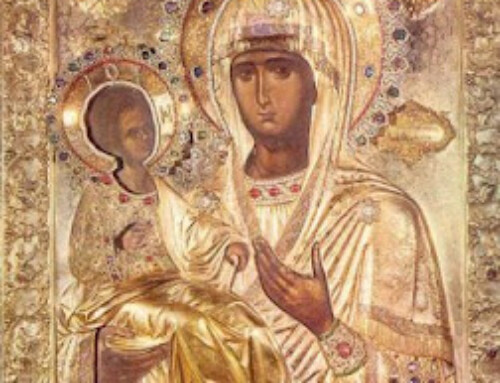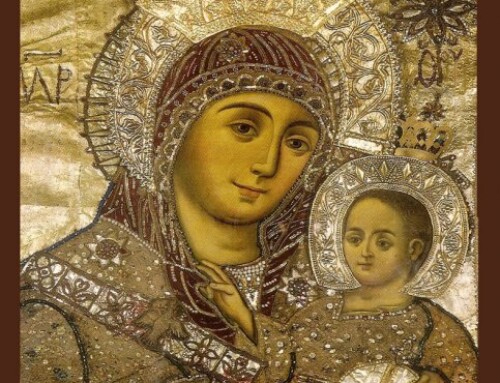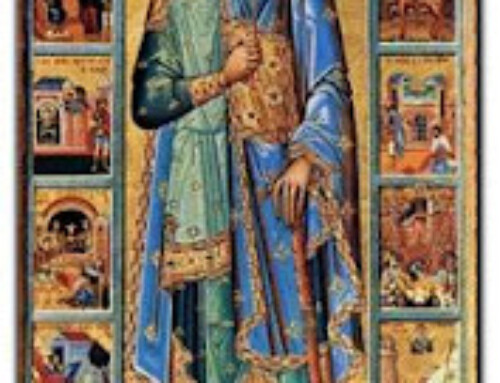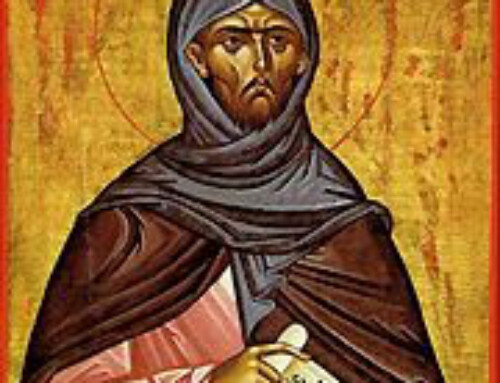Word Magazine April 1961 Page 7/27
THE SPIRIT OF ST. VLADIMIR
By His Eminence, The Most Reverend Metropolitan Anastossy
St. Vladimir (who introduced Christianity into Russia during his reign as Prince of Kiev and therefore is deemed the equal of the Apostles) is a phenomenal milestone in Russian history. His great achievement is of eternally enduring significance not only for the Russian people but for all of Christian Europe.
The greatness of his heroic deeds as a Christian and a statesman won even the acclaim of his contemporaries. There is eloquent evidence of that in the two eulogies to him as the Enlightener of Russia that have come down to us. His deeds and personality, endowed with Christian virtues, are not merely recorded in these accounts but serve as the object of his glorification as the Baptist of Russia.
The first of these eulogies, by the famous Ilarion, the first Russian Metropolitan of Kiev, would have been a literary ornament for any age by virtue of its profundity, inspirational power and grace of form. Its very perfection is in itself the best eulogy of St. Vladimir, for it is one of the first fruits of that Christian enlightenment that grew from the seeds he had sown.
It is with an undimmed splendor, as all-penetrating as the sun, that St. Vladimir beams upon us from his heavenly heights. The very best attributes of our national character are fused and reflected in him, like rays converging toward a common center. From him stems Russia — the land, the people, the nation. He foreordained for all times the course of our spiritual, political and national development.
The Russian people not only became imbued with the Christian faith but have preserved it “true and undefiled” to this very day, notwithstanding all the historical tribulations and shocks that our Fatherland and our Russian Church have had to endure throughout the ages.
Beauty it was that drew St. Vladimir to the Greek religion and disclosed to him its truth. It was through the appeal to beauty that he was able to transmit it to the Russian people. His aspiration for the lofty and the beautiful became theirs. Since then the soul of the Russian nation has ever been aglow with quenchless thirst for harmony and beauty. Hence our gentleness of spirit, our love of peace, our efforts of peacemaking, our yearning to embrace all, to appease all, to forgive all. Hence the gentle and orderly rhythm of our icon-painting and of our liturgical chants. Hence the harmoniously exultant ring of our church bells. Hence the beauty of our national soul, the musicalness of our euphonious speech.
It was the ferocious yoke of the Tartars that first darkened for a time this guiding torch and in some measure vitiated the spiritual qualities of the average Russian. Yet the sacred flames lighted by St. Vladimir were not entirely extinguished even during those many years of utter darkness. They continued to warm and illumine the Russian heart from the inside — until they flared forth again with the renewed and binding force as the concept of the “Third Rome.”
Then again the ideal of Holy Russia was for a time overcast during the Times of Troubles. And again it blossomed forth anew during the reign of “the most pacific and pious” Tsar Alexis Mikhailovich — especially during the first part of his rule, when he was in perfect accord with his intimate friend, the Patriarch Nikon. They jointly aspired to make the Russian State a Kingdom of God on earth. Even after the parting of the ways between them they continued to pursue the same ideal, although separately and from differing points of view.
Through the window cut into Europe by Peter I, the eighteenth century brought to us from abroad tendencies historically alien to our national tradition. It was a time especially unpropitious for those who yearned most to live in accordance with the legacy of St. Vladimir. But then again the nineteenth century saw the restoration and revitalization of St. Vladimir’s legacy — not only in Russia’s national consciousness, where it had never died, but even in the most conscious part of the nation generally known as the educated society.
The outbreak of the World War, which drew us into Eastern Europe in defense of our oppressed Orthodox Slavonic brethren and lured us beyond that to the very gates of Constantinople, that we might implant the cross on Saint Sophia, saw the Russian nation permeated with the sacred messianic dream and roused to action from top to bottom, so that people forgot their internal divisions, rallied around their Tsar and were molded by that dream into a truly spiritual monolith. Had we remained true to our selves to the very end, and had we persisted in the heroic quest before us, we might have finally achieved the realization of our national aspiration to be the bulwark of Christ’s truth and the heralds of universal brotherhood on earth.
But the Russian nation did not endure its trial. Hence it was cast from the heights into the abyss. In the days when, tired out by the war, the people were weary in spirit, Satan appeared before them in the guise of the Bolsheviks and said, “Bow to me, and that which ye have long desired to possess I shall grant ye without struggle and without suffering.” The tempter used for seduction the original Russian messianic aspirations, deftly substituting the new ideal for the old by slipping in soulless internationalism in the place of universal brotherhood, lies and hatred in place of love and truth, Anti-Christ in the place of Christ.
Many Russians were quick to realize the danger to their country in this temptation. They therefore fled abroad, the better to defend their sacred legacy and save it from defilement. The more ominous grew the course of events in Russia, the more destructive became the activities of the Bolsheviks, who wanted to eradicate from the Russian soul everything inculcated into it by St. Vladimir, the more the Russian people came to appreciate the sacred legacy that stemmed from ancient Holy Russia. And St. Vladimir became to them the very personification of that legacy.
Today St. Vladimir reigns over the minds and hearts of all true Russians. They are again under the sway of his power. From the remotest corners of our Diaspora — from England to China, and from China to America — the name of St. Vladimir is praised and his achievements (which are still imperfectly appreciated by us) glorified.
Immersing ourselves in the baptismal font of the stirring recollections of our ancient history, we emerge regenerated in spirit. Again we come to know who and what we are. We value more profoundly and more sincerely than ever before our Orthodox faith, our very own Church and the spiritual culture it has created. It is noteworthy that the young generations of Russians born abroad, who have neither touched their native soil nor breathed its air, sense no less vividly than their fathers and grandfathers their spiritual kinship with ancient Russia and with its Enlightener, St. Vladimir.
The most valuable acquisition to be gained is undoubtedly the realization by all of us of the importance for our national constructive effort of the Vladimirist principles of Orthodoxy. If Russia is to arise again for a new lease on life, it must base that life solely on the ancient foundations of Holy Russia as laid down by its Enlightener. Only Orthodoxy, with its inexhaustible life-giving creative force, can again revivify and exalt the Russian nation.
Through the harmonious and spiritual beauty of our church service Vladimir came to know the truth of Orthodoxy. Today the very same attraction draws votaries of other faiths and religions to the gates of the Orthodox Russian Church. Our Enlightener is far from parsimonious! He continues to this very day to cast the sacred pearls he has acquired for us throughout all the countries of the world, scattering them with a generous hand. The message of our Church goes to all the lands. In all the corners of the universe resound its solemn words and its hymns in honor of its Founder, forecasting to us the resurrection of his ancient appendage and our common fatherland, Russia.
We are confronted with the words of that universal messenger of good will and the greatest of all the missionaries, the Apostle Paul: “having nothing, yet possessing all things. . . “ We are deemed “dying, and, behold, we live.” (II. COR., 9, 10). The nation that in the midst of its tribulations has not extinguished its guiding light and has preserved its fondest aspirations, with eternity as its goal, has not perished. It lives. And it deserves to live.





